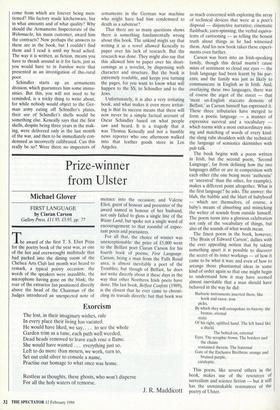Prize-winner from Ulster
Michael Glover
The award of the first T. S. Eliot Prize for the poetry book of the year was, as one of the hot and overwrought multitude that had packed into the dining room of the Chelsea Arts Club last month was heard to remark, a typical poetry occasion: the words of the speakers were inaudible, the microphone having gone on the blink; the roar of the extractor fan positioned directly above the head of the Chairman of the Judges introduced an unexpected note of menace into the occasion; and Valerie Eliot, guest of honour and presenter of the award named in honour of her husband, not only failed to gloss a single line of the Waste Land, but spoke not a single word of encouragement to that roomful of expec- tant poets and poetasters.
For all that, the choice of winner was unexceptionable: the prize of £5,000 went to the Belfast poet Ciaran Carson for his fourth hook of poems, First Language. Carson, being a man from the Falls Road area, is almost inevitably a poet of the Troubles; but though of Belfast, he does not write directly about it these days in the way that other Northern Irish poets have done. His last book, Belfast Confetti (1989), is the closest that he ever came to chroni- cling its travails directly; but that book was
as much concerned with exploring the array of technical devices that were at a poet's disposal — disjunctive narrative; cinematic flashback; yarn-spinning; the verbal equiva- lents of cartooning — as telling the honest truth about things as he had witnessed them. And his new book takes these experi- ments even further.
Carson was born into an Irish-speaking family, though this detail mustn't cause mists of sentiment to cloud our eyes — the Irish language had been learnt by his par- ents; and the family was just as likely to communicate in English as in Irish. And, overlaying these two languages, there was of course the argot of the street — that 'most un-English staccato demotic of Belfast,' as Carson himself has expressed it. These three tributaries have merged to form a poetic language — a manner of expressive survival and a vocabulary which teems with a most extraordinary mix- ing and matching of words of every kind: the slang rubs shoulders with the technical; the language of semiotics skirmishes with pub talk.
The book begins with a poem written in Irish, but the second poem, 'Second Language', far from defining how the two languages differ or are in competition with each other (the one being more 'authentic' or 'ancestral' than the other, for example), makes a different point altogether. What is the first language? he asks. The answer: the blah, the babble and the blurt of babyhood — which are themselves, of course, a baby's means of absorbing and mimicking the welter of sounds from outside himself. The poem turns into a glorious celebration not only of the vocabulary of things, but also of the sounds of what words mean.
The finest poem in the book, however, 'The Brain of Edward Carson', dallies with the ever appealing notion that by taking something apart it is possible to discover the secret of its inner workings — of how it came to be what it was; and even of how to arrange those phantasmal ideas in some kind of order again so that one might begin to understand how it may have seemed almost inevitable that a man should have behaved in the way he did:
Barbaric instruments inserted there, like hook and razor, iron picks, By which they will extrapolate its history: the bronze, eternal static Of his right, uplifted hand. The left hand like a shield.
The bolted-on, external Eyes. The seraphic frown. The borders and the chains contained therein. The fraternal Gate of the Exclusive Brethren: orange and bruised purple, cataleptic.
This poem, like several others in the book, makes use of the resources of surrealism and science fiction — but it still has the unmistakable resonances of the poetry of Ulster.


















































 Previous page
Previous page